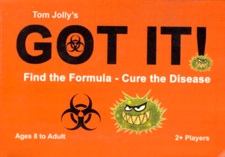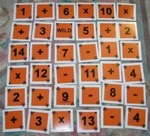by Demian Katz
 Tom Jolly's Got It! (2010)
Tom Jolly's Got It! (2010)
Published by QualityTime Resources
Designed by Tom Jolly
Illustrated by David Niecikowski
Contents: 36 formula cards, 34 disease cards and instructions
2 or more players
$9.99
Tom Jolly has been designing games for quite some time, and he's well
known enough to get his name prefixed to the titles of his designs. In
spite of this, Got It! is the first of his games that I have had
an opportunity to try for myself. From what I know, this is a somewhat
atypical design; Jolly is best-known for fairly theme-heavy fantasy
games like WizWar and Cave Troll, but Got It! is a
light and abstract game that, more than anything else, is about
math.
Gameplay
At the start of the game, the formula cards are shuffled and laid out in
a 6x6 grid of alternating numbers (between 1 and 14) and mathematical
operators (+, -, x, wild). The disease cards are shuffled and stacked
face down.
 Gameplay is simple: the disease cards are turned up one at a
time, revealing target numbers. Players race to find sets of five
adjacent formula cards in the grid that can be combined to meet the
target number. For example, if the disease card valued "20" comes up,
and the grid contains a sequence of cards that build the formula "2 x 4
+ 12", the first player to spot this sequence would cure the disease and
win the card as a trophy. Occasionally, nobody will be able to find a
formula for a target number; when this happens, the card is set aside.
After the deck runs out, cards that previously could not be solved with
a five-card formula are tried again, only this time seven cards may be
used to build the formula. In either case, players cannot double back
to cards they've already used in that solution – each card can
only be used once per formula. When there are no more target numbers
left to tackle, the player who has earned the most cards wins the
game.
Gameplay is simple: the disease cards are turned up one at a
time, revealing target numbers. Players race to find sets of five
adjacent formula cards in the grid that can be combined to meet the
target number. For example, if the disease card valued "20" comes up,
and the grid contains a sequence of cards that build the formula "2 x 4
+ 12", the first player to spot this sequence would cure the disease and
win the card as a trophy. Occasionally, nobody will be able to find a
formula for a target number; when this happens, the card is set aside.
After the deck runs out, cards that previously could not be solved with
a five-card formula are tried again, only this time seven cards may be
used to build the formula. In either case, players cannot double back
to cards they've already used in that solution – each card can
only be used once per formula. When there are no more target numbers
left to tackle, the player who has earned the most cards wins the
game.
This is at heart a very simple game, and rules are provided to make it
even simpler when younger players are participating – simply by
removing certain numbers and operators, the game can be made extra
kid-friendly.
Presentation
Got It! is presented in a minimalist fashion. The instructions
are a single black and white page, and the cards are fairly small and
feature only a couple of original graphics. In spite of the lack of
visual variety, the graphics that are present are quite appealing. My
copy of the game includes some cards that have been hand-corrected in
permanent marker, but I am not sure if this is typical of the product or
if this is unique to my review copy. In any case, my biggest criticism
of the game's presentation is that the rules could have been made a bit
clearer. Some minor details, like how order of operations affects
formulas or whether you may double back and reuse cards within a
formula, are never fully explained. A bit more text or a few extra
examples might have made the game slightly less ambiguous... but as it
is, it's not too hard to agree on house rules to resolve any disputes
that arise.
Conclusions
The value of Got It! depends on what you are looking for. The
"race to solve the puzzle" format makes it a good option for large
groups of players, since you can accommodate a lot of people as long as
they're all able to see the grid... but for adult gamers, solving math
problems can wear thin after a while, and something like Ricochet
Robots will probably offer more lasting value within the genre.
Even so, this is entertaining enough for a play or two, and if you are
looking for a tool to help kids practice math, you definitely won't be
disappointed. Even though the arithmetic is barely disguised at all,
the game format makes it surprisingly palatable. This game is unlikely
to be viewed as one of Tom Jolly's more significant designs, but it is
nonetheless a solid piece of edutainment that's just challenging enough
to engage adults as well as children.
Links:
| Related reviews on OgreCave: |
- Drakon, also by Tom Jolly (Fantasy Flight Games)
|


 Tom Jolly's Got It! (2010)
Tom Jolly's Got It! (2010) Gameplay is simple: the disease cards are turned up one at a
time, revealing target numbers. Players race to find sets of five
adjacent formula cards in the grid that can be combined to meet the
target number. For example, if the disease card valued "20" comes up,
and the grid contains a sequence of cards that build the formula "2 x 4
+ 12", the first player to spot this sequence would cure the disease and
win the card as a trophy. Occasionally, nobody will be able to find a
formula for a target number; when this happens, the card is set aside.
After the deck runs out, cards that previously could not be solved with
a five-card formula are tried again, only this time seven cards may be
used to build the formula. In either case, players cannot double back
to cards they've already used in that solution – each card can
only be used once per formula. When there are no more target numbers
left to tackle, the player who has earned the most cards wins the
game.
Gameplay is simple: the disease cards are turned up one at a
time, revealing target numbers. Players race to find sets of five
adjacent formula cards in the grid that can be combined to meet the
target number. For example, if the disease card valued "20" comes up,
and the grid contains a sequence of cards that build the formula "2 x 4
+ 12", the first player to spot this sequence would cure the disease and
win the card as a trophy. Occasionally, nobody will be able to find a
formula for a target number; when this happens, the card is set aside.
After the deck runs out, cards that previously could not be solved with
a five-card formula are tried again, only this time seven cards may be
used to build the formula. In either case, players cannot double back
to cards they've already used in that solution – each card can
only be used once per formula. When there are no more target numbers
left to tackle, the player who has earned the most cards wins the
game.